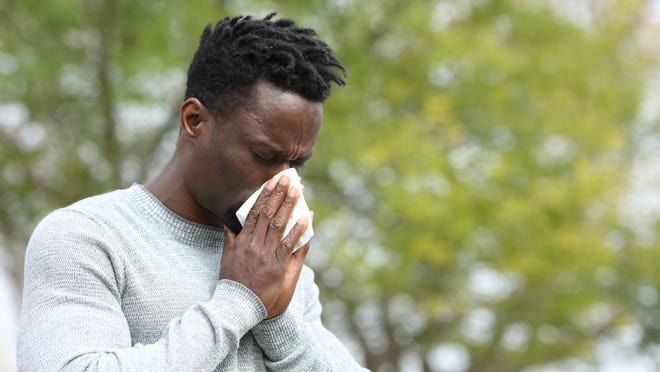
Allergy season is upon us, and just as fast as you're blowing your nose, social media is blowing up with "hacks" to make your sniffles and itchy eyes more bearable. But do they actually work?
Dr. Tania Elliott, a board-certified internist, allergist and immunologist, says allergies are an abnormal response to something normally occurring in the environment. Symptoms can include itching, swelling and redness, which is why many look for relief.
"The most common allergens are things that are found in the air," she adds. "In the springtime, you get allergies to tree pollens. In the summertime, it's more grass pollen. And in the late summer all the way up until the first frost, it's between ragweed pollen as well as outdoor molds."
On TikTok, people are scavenging for ways to help ease seasonal allergies. The hashtag #allergyhack has 4.2 million views, #allergyrelief has 6.3 million views and #seasonalallergies has 18.3 million.
In order to determine if social media-recommended tips are helpful or a hoax, we had experts weigh in.
Does local honey, nettle leaf tea help allergies?
One popular tip shared online is that consuming local honey can help treat and even prevent allergies.
It assumes that honey from a local area contains seasonal pollens representative of your region," says Dr. Jeanne M. Lomas, director of allergy and immunology at WellNow Allergy. "By consuming the honey regularly, you would be ingesting a 'dose' of the pollen as well, hoping to build up an immunity to these allergens. Unfortunately, scientific studies have failed to prove consistently the benefits of local honey on allergy relief."
Elliott agrees that, in theory, this strategy of inducing tolerance makes sense – and is similar to what is done with allergen immunotherapy. The difference, however, is that with immunotherapy, medical professionals know exactly what the person is allergic to and control the amount given to them, steadily increasing the amount over time.
"There's a couple of reasons why the local honey concept is inaccurate. One is the types of flowers that bees pollinate for the most part are not the things that cause people to have allergies," she says. "(And) there's really not a good way to increase the dosage of it to really get an impactful response from the immune system."
"That said, there's not a ton of harm in it," she says, adding that she suspects people start to feel better with this method because the honey itself has a soothing effect on a scratchy throat.
Does TikTok’s ‘pomegranate pump’ actually work? The answer may surprise you
This 'internal shower' drink went viral on TikTok: What is it? And is it safe?
For more certain results, Lomas recommends allergy immunotherapy prescribed by an allergist in the form of injections or FDA-approved tablets, which are "a well-studied and highly effective way to provide controlled doses of allergens."
"Allergy immunotherapy is the only potentially curative treatment for seasonal and environmental allergies," she notes.
Another ingredient people claim helps with their allergies is nettle leaf tea.
While both nettle leaf and the butterbur plant are natural antihistamines, Elliott says the challenge with some herbal supplement options is not knowing how much you're consuming.
In general, Lomas asks patients to be cautious with herbal supplements and remedies.
"For the general population they may be safe and effective, however for most of my patients, who are allergic to plants – trees, grasses, weeds – they can be detrimental," she cautions. "Herbal remedies can be in the same plant family as some of the seasonal pollens and thus I have actually seen allergic reactions to various plant products and essential oils, especially when applied directly onto the body."

If patients still decide to try them, Lomas recommends using caution and discussing any side effect with your allergist.
To help soothe allergy-induced itchy eyes, some on social have suggested using a cold face mask or compress.
This hack is doctor approved! "When you have an allergy, it causes swelling in the blood vessels," Elliott explains. "So the cold itself will work to combat that."
In addition to helping soothe swelling and redness, Elliott explains the cold can almost trick the brain to ignore your itching since the sensations of itch, cold and pain are transmitted through the same sensor and "can't transmit all those things at once."
More tips to help with allergy season
People can take environmental precautions to decrease exposure to seasonal pollens, explains Lomas.
"These include keeping windows closed and running (air conditioning) units, if available, in the warmer months," she adds. "Removing jackets, clothing and shoes and washing off following extended periods outdoors can be helpful in reducing pollen exposure as well. If you are unable to bathe immediately, aim to at least wash hands frequently and try to avoid touching your face (especially eyes and nose) to reduce pollen transmission to these areas."
Pets can also track pollen in on their bodies, so washing hands after petting or caring for animals (as well as periodically washing your animals) can be helpful, Lomas adds.
Medical treatments for allergies are available over the counter as well.
"These include oral antihistamines (pills, chewable tablets or liquids) that can be taken daily as needed, medicated nasal sprays and several types of eye drops," Lomas says. "My favorite are non-medicated eye drops that contain only lubricant. These can be refrigerated and placed in the eyes throughout the day for a cooling effect."
Elliot recommends treating allergies before they start flaring up, if possible.
"If you know that fall is your season, start a regimen at the end of August," she explains. "Getting into this routine before you allergies start to get bad is your best chance of keeping things under control. Once your allergies flare, it is a lot harder to stop the inflammation."
If allergy symptoms persist despite over-the-counter medication, Lomas advises talking with your doctor. And if you aren't sure what you're allergic to or what medicine to take, Elliot suggests seeing an allergist who can confirm a diagnosis and get you on the right treatment plan.
Otherwise, happy (careful) hacking!
Can daily coffee use increase your lifespan? Here's what the latest research says
Got an injury?:Should you reach for an ice pack or heating pad?
Source link









